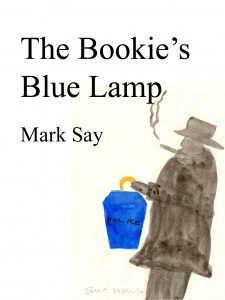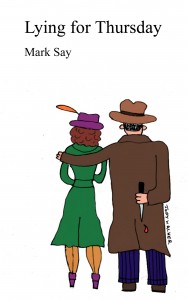Britain won the war, but for London it was a grim and frustrating peace. In the late 1940s swathes of the city had been reduced to rubble, rationing kept most of life’s goodies in short supply, and old bigotries were rising again. The black market flourished, crime was on the rise, anti-semitism was snarling and homophobia was rampant.
A lot of people still believed they could build a better world, and others wanted lives better than those they had. But life was a series of little battles against the dreary reality of austerity, petty restrictions and quiet persecutions. For some it was a struggle against more threatening forces, in which their freedom and even their lives were at stake.
Austerity sucked lot of people into the dark side of the city.
The Bookie’s Blue Lamp
It’s 1948 and London is still licking its wounds from the war. Swathes of the city are in rubble, there’s not enough of anything, and the black market is thriving, with most policemen ready to take their share of the backhanders on offer.
 Albert Dunn is doing well for himself, buying and selling what people can’t get on rations and running a street bookie business around Rotherhithe. Detective Sergeant Harry Pullman is his paymaster for the local police, and the one who tips him off when he steps over the line.
Albert Dunn is doing well for himself, buying and selling what people can’t get on rations and running a street bookie business around Rotherhithe. Detective Sergeant Harry Pullman is his paymaster for the local police, and the one who tips him off when he steps over the line.
But PC Johnny Crick – straight, self-righteous and still filled with the anger from the war – won’t play the game. When he arrests one of Dunn’s runners it takes a visit from Pullman, and a threat to turn a good deed against him, to bring him into line.
It leads to a tangle of deceit, threats and violence. Crick confronts a betrayal, Pullman is trapped by a nightmare from his past, and Dunn faces his deepest fear. It’s soon clear that the fight won’t be over until a lot of blood has been spilled.
The Bookie’s Blue Lamp tells a story of corruption, disillusionment and the murky morality of a city exhausted by war.
Lying for Thursday
Mary Barraclough spent the war driving bomber crew to their aircraft, knowing that often they wouldn’t come back. She kept herself detached from their fate, except for the night that Billy Stone jumped into the driver’s cab and flirted until disappearing into the sky.
 Five years later Mary is a suburban housewife, suffocating in her marriage to Vernon, a man who wants nothing but safety and conformity, and socialising with narrow minded snobs. Her only relief is a weekly trip to London and memories of the danger she touched during the war – until a chance meeting with Billy Stone.
Five years later Mary is a suburban housewife, suffocating in her marriage to Vernon, a man who wants nothing but safety and conformity, and socialising with narrow minded snobs. Her only relief is a weekly trip to London and memories of the danger she touched during the war – until a chance meeting with Billy Stone.
They see each other on Thursdays. She tells a series of lies to her husband; Billy charms and introduces her to little pleasures she had not known. At first she feels guilty but flattered, then excited when she realises that Billy lives among spivs and thieves. The temptation to throw away her married life grows.
But Billy has his secrets, and there’s a violent side to his life that he struggles to keep hidden from Mary. And as her husband detects her lies he begins to unleash the dark side of his own character.
As Mary’s emotional turmoil intensifies she is dragged towards the dangers of Billy’s life and the realisation that she is in mortal danger.
Lying for Thursday tells a story of frustration, sexual longing, deceit and desperation in a stifling and dishonest Britain after the war.
Beside the Pit
London, 1948. Sam Lawson is a Jewish copper, quietly raging at the wartime fate of his people and secretly beating up anti-semites. Harvey Kent is a star actor who woos women in public but sporadically commits the crime of falling into bed with young men. He gets his black market goodies from Larry Williams, a homosexual spiv who fought bravely in the war but now lives on the wrong side of the law.
 The three men are thrown together by the killing of Larry’s Jewish boyfriend Jimmy. The police see Larry as the main suspect, but Sam realises they had shared a horrifying moment of the war, and believes Jimmy was killed because he was a Jew. Larry struggles against despair, discovers that Harvey has secrets and begins to pursue the actor. Harvey is tortured by his impulses and begins to behave erratically.
The three men are thrown together by the killing of Larry’s Jewish boyfriend Jimmy. The police see Larry as the main suspect, but Sam realises they had shared a horrifying moment of the war, and believes Jimmy was killed because he was a Jew. Larry struggles against despair, discovers that Harvey has secrets and begins to pursue the actor. Harvey is tortured by his impulses and begins to behave erratically.
Suspicions fester, lies are exposed and the sense of danger intensifies as Sam confronts his demons and the other men fear for their fates.
Beside the Pit is a gripping murder story that depicts the dark side of post-war Britain, a society in which prejudice ran deep and good lives were broken, but some people made brave stands in the cause of decency and justice.